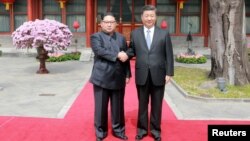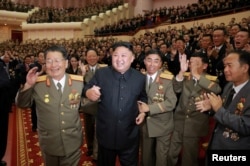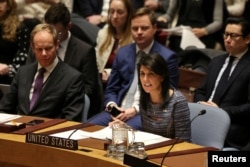As relations between Beijing and Pyongyang thaw slightly, the prospect of China relaxing its sanctions imposed on North Korea and thwarting U.S. President Donald Trump's “maximum pressure” campaign makes experts wary.
In an attempt to renew relations with China, North Korean leader Kim Jong Un made an unexpected visit to Beijing to meet with Chinese President Xi Jinping last month.
Experts on the North Korean economy speculate that Kim may have asked Xi to ease sanctions during his visit and that if Xi, in fact, agreed, the move could complicate the U.S. effort to exert pressure on North Korea ahead of a nuclear summit tentatively set to take place with Trump in May.
“It makes sense that Kim would go to China and beg for a relief,” said William Brown, an adjunct lecturer in the Georgetown University School of Foreign Service.
“And it would also make sense that China would give him a little bit of relief. So I suspect that there is some of that going on,” said Brown, a former U.S. intelligence officer who is affiliated with the Korea Economic Institute of America.
Border crossings alleged
According to a representative of North Korea Refugees Human Rights Association of Korea, a South Korean-based group helping North Korean defectors, a source in China saw an influx of what appears to be hundreds of North Korean women arriving in the Chinese border city, Helong. The source said he saw them crossing the North Korean border into the Chinese city on April 2, just a few days after Kim's visit to Beijing, to work at electronics manufacturing factories.
VOA has found the South Korean rights group to be a reliable source in the past but has not confirmed the report of workers crossing into China or authenticated the brief video provided by the group.
If confirmed, it could be a violation of United Nations’ sanctions. The U.N. Security Council passed Resolution 2371 in August 2017 saying that “all Member States shall not exceed on any date after the date of adoption of this resolution the total number of work authorization for (North Korean) nationals provided in their jurisdiction at the time of the adaption of this resolution.”
The group’s source in China also said, “After Kim Jong Un’s return (back to North Korea upon his visit in Beijing), the (Chinese) border patrol eased.”
Brown thinks Xi could have softened sanctions in return for Kim’s agreement to halt any ballistic missiles or nuclear weapons tests.
“I would be surprised if they didn’t make some kind of a deal and that China might relent in some ways,” he said.
“I also think that China doesn’t give away anything to anybody,” Brown added. “And it would come at some cost. …The Chinese presumably are asking for, as in U.N. sanctions, no tests, no nuclear tests.”
Jonathan Schanzer, a senior vice president of the Foundation for Defense of Democracies and a former terrorism finance analyst at the U.S. Treasury Department, said China has been providing “permissive jurisdiction,” which makes it easier for North Korea to defy sanctions.
“When it comes to North Korea, it lacks enforcement of sanctions, a large amount of financial transactions being processed by Chinese institutions,” Schanzer told VOA's Korean Service. “This comes despite the fact the U.S. has been trying to place maximum pressure on North Korea.”
Brown thinks it is “important for (the U.S.) to keep China on (its) side.”
'Lack of will'
Schanzer, however, said “there’s a lack of will on the part of China to implement or to enforce these sanctions,” especially now as trade relations between Beijing and Washington have become tense due to Trump imposing tariffs on Chinese imported goods.
“China and the United States are farther apart now than they were a few weeks ago, and even then, it was a challenging relationship as it relates to North Korea,” Schanzer said.
In mid-March, China submitted its sanctions implementation report to the U.N. Security Council.
In the report, China said it has been adhering to U.N. resolutions that banned exporting iron, steel, industrial machinery, and transportation vehicles and limited exporting petroleum products to North Korea.
China also said in the report that it suspended a plan to extend work permits to North Korean workers beyond December 2019.
Last week, the U.N. imposed what Nikki Haley, the U.S. ambassador to the U.N., called the largest-ever sanctions against North Korea. The U.N. Security Council added to its previous sanctions list of 27 ships, of which five are based in China, 21 shipping companies, and a Taiwanese man accused of helping the regime circumvent previous sanctions.
This week, the U.S. State Department called on Beijing to press North Korea to give up nuclear weapons.
“Our ultimate goal remains the denuclearization of the Korean Peninsula,” a State Department spokesperson told VOA’s Korea Service when asked what role China should play in denuclearizing North Korea. “We expect that China will use its unique leverage to ensure (North Korea) is serious about credible negotiations that lead down that path of denuclearization.”
When Kim visited Beijing, Xi suggested to Kim that they should “promote exchanges and cooperation between the two countries.” Kim responded in return, saying he would “carry on and develop the (North Korea)-China friendship that remains unchanged despite winds and rains, and elevate it to a new high under new circumstances.”
Kim met with Xi ahead of the planned summit with South Korean President Moon Jae-in, slated to take place inside Panmunjom on April 27, and the summit with Trump, set to take place at an unspecified location sometime in May but not yet confirmed.
This story was written by Christy Lee. Jiha Ham contributed to this report which originated on VOA's Korean Service.






